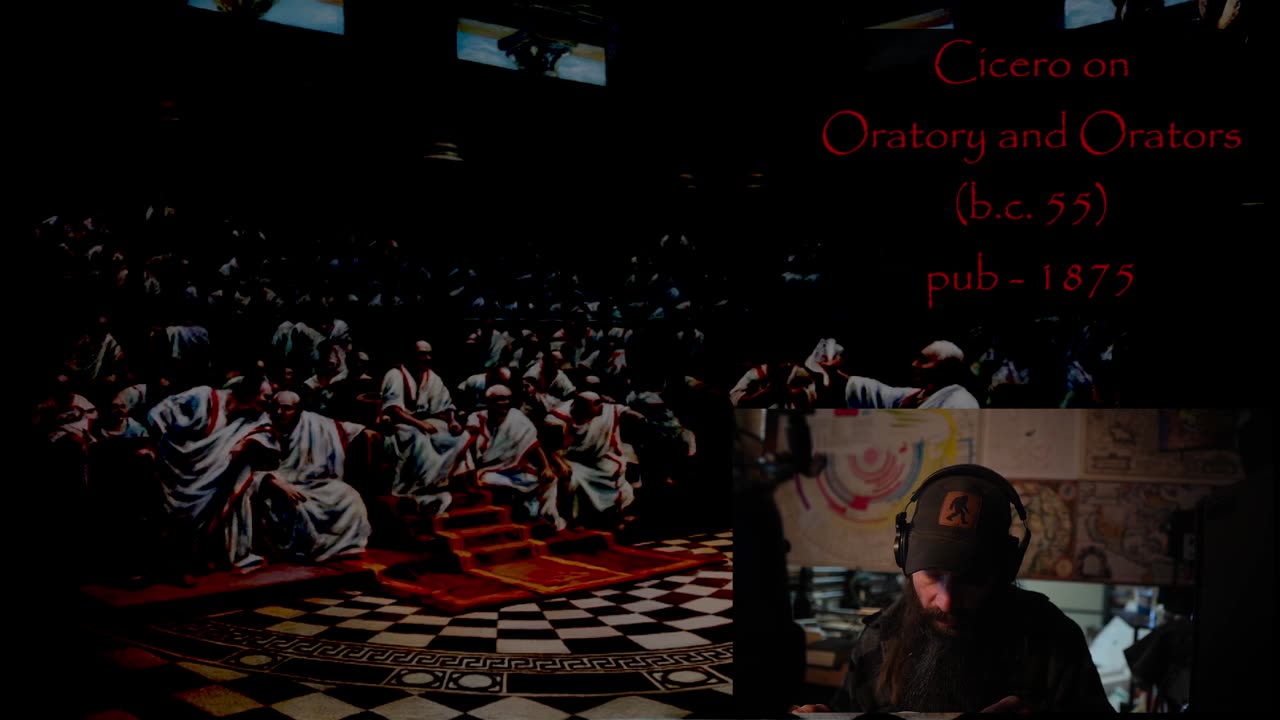Premium Only Content

Cicero on Oratory - B2 - XV XVI
Cicero on Oratory - B2 - XV XVI
In this video, the speaker discusses the relationship between the study of history and the art of oratory, emphasizing the orator's need for knowledge of history and various subjects to speak effectively. Key principles of writing history are laid out, including the necessity for truthfulness, a systematic presentation of facts, and the orator's role in addressing broader, often undefined subjects such as morality, public affairs, and virtues. The speaker critiques existing rhetoric treatises for lack of comprehensive guidance on these matters, urging the need for eloquence across various topics that influence society.
Key Points:
Importance of Historical Knowledge
The orator must be well-versed in history, as it is critical for effective communication and understanding. Knowledge of historical events and context enables the orator to speak with authority and credibility.
Truthfulness in Historical Writing
An essential rule for historians emphasized in the video is the requirement to present the whole truth while avoiding falsehood and bias. This foundational principle ensures that the orator maintains integrity in their discourse.
Structure of Historical Presentation
The speaker outlines that when writing history, one must present information in a structured manner that reflects chronology, significance, and character involvement. The audience expects clarity in how events relate to one another.
The Broad Scope of Oratory
The orator is not limited to speaking on defined subjects; they must be prepared to discuss a wide range of topics, including abstract concepts of good, evil, and virtues. This versatility demonstrates the orator's skill in engaging with any subject matter.
Critique of Rhetorical Treatises
The video critiques established treatises on rhetoric for failing to cover a wide spectrum of oratorial duties, such as exhortation and consolation, which are vital for effective communication and engagement.
Connection Between Art Forms
The speaker draws a parallel between oratory and other arts, such as painting, suggesting that mastering fundamental principles allows the orator to adapt to various subjects and contexts without needing exhaustive separate instruction.
-
 LIVE
LIVE
Lofi Girl
2 years agoSynthwave Radio 🌌 - beats to chill/game to
136 watching -
 LIVE
LIVE
The Official Steve Harvey
12 days ago $4.73 earned24 HOURS OF MOTIVATION w/ STEVE HARVEY
2,847 watching -
 25:56
25:56
DeVory Darkins
16 hours ago $0.09 earnedTrump drops ULTIMATE BOMB on Democrat Mayors as ICE makes SHOCKING Announcement
6.99K75 -
 LIVE
LIVE
TonYGaMinG
1 hour ago🟢 ABI WITH FRIENDS | 🍩JOE DONUTS | 😶 🌫 VLADSGAMINGCARTEL |
35 watching -
 21:24
21:24
marcushouse
7 hours agoStarship Flight 10: Go or No? 🚀
1925 -
 LIVE
LIVE
MrR4ger
13 hours agoSUNDAY FUNDAY w/ R4GER - VARIETY / DIABLO 4/ FOR HONOR / ETC?
81 watching -
 5:40
5:40
WhaddoYouMeme
3 days ago $0.10 earnedThey’re Calling This the End of Masculinity
4284 -
 15:24
15:24
Tactical Advisor
16 hours agoBest 2011 of 2025 | Bul Armory Ultralight Pro
829 -
 27:31
27:31
True Crime | Unsolved Cases | Mysterious Stories
2 days agoThe Hong Kong Schoolgirl Mystery – 5 Mysterious Unsolved Cases (Part 8)
1711 -
 7:19
7:19
China Uncensored
22 hours agoChina is DONE in the South China Sea
2.35K11